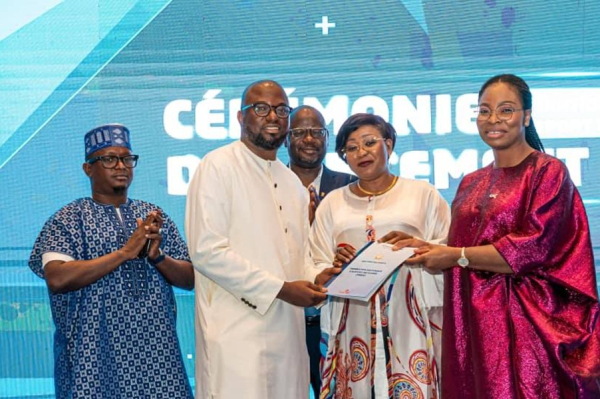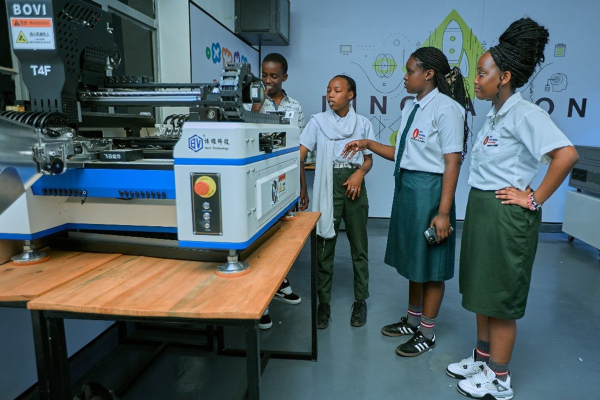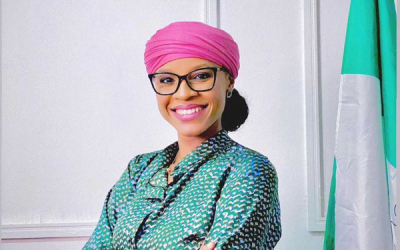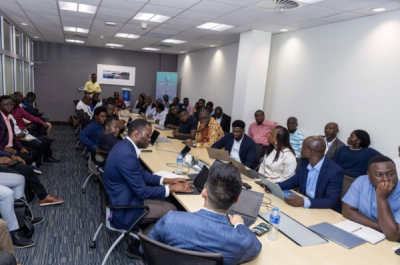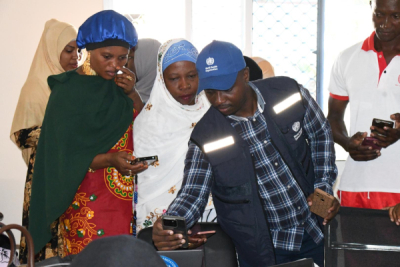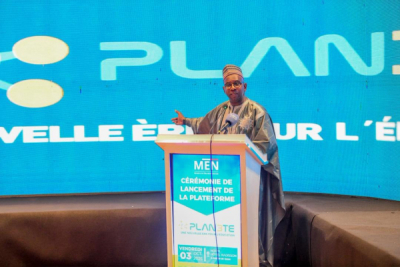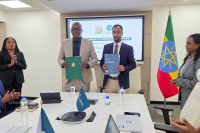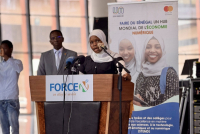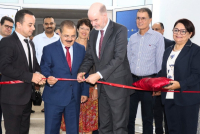
Tech (1148)
-
The new body will oversee and promote electronic sports in the country.
-
The initiative highlights esports as a driver of innovation and youth opportunity.
-
It follows major national gaming tournaments backed by Orange Guinea.
Guinea has officially launched its Esports Federation, the national body overseeing electronic sports. Rose Pola Pricemou (pictured, right), Minister of Posts, Telecommunications and the Digital Economy, attended the official launch ceremony on October 11 alongside several government officials and representatives from the digital, sports, and cultural sectors.
“This initiative marks an important step in recognizing esports as a promising sector that combines digital inclusion, innovation, creativity, and economic opportunities for Guinean youth,” the ministry said in a statement on its Facebook page.
The launch comes about three months after the first national tournament, “FIFA Champions Guinea 2025,” held on June 27–28 at Chapiteau By Issa. Telecom operator Orange Guinea is also set to organize the “Orange FC Championship 2025” from October 25 to 26 to crown the country’s best EA FC 26 player. The winner will represent Guinea at a grand final in Morocco, featuring champions from 16 other Orange subsidiaries across the Middle East and Africa.
During the launch event, Minister Pricemou emphasized the need to support this growing sector, mobilize partners and sponsors, and encourage Guinean youth to seize new opportunities. According to a report by African game publisher Carry1st and market research firm Newzoo, Africa’s video game market reached $1.8 billion in 2024, up 12.4% from the previous year, compared with global growth of 2.1% over the same period.
- New Generation Academy to launch on October 13 for top-performing students
- Program offers hands-on training in coding, robotics, and STEM fields
- Initiative aims to equip youth with skills for Africa’s digital economy
Kigali is now home to New Generation Academy, the first accredited school in Rwanda offering professional training in software programming and embedded systems. The program, set to launch on October 13, targets students who have completed Senior 3 with strong results in the 2024/2025 national exams.
New Generation Academy stands out for its practical, project-based approach. From the early years, students receive training in coding, robotics, and STEM subjects science, technology, engineering, and mathematics. The school emphasizes hands-on learning, offering programs aligned with both national and international systems through an equivalence certificate issued by the Higher Education Council (HEC).
The school’s opening comes as coding and tech education gain momentum across Africa. Its mission is to meet the continent’s growing demand for digital skills and prepare young people for careers in the emerging digital economy. According to the “Foresight Africa 2025–2030” report by the Brookings Institution, around 230 million jobs in sub-Saharan Africa will require digital skills.
New Generation Academy’s program is designed to equip students with advanced programming abilities, practical project experience, and exposure to innovative technologies. Such initiatives are helping to train a new generation of tech talent capable of supporting start-up growth and driving Africa’s digital transformation.
-
Nigeria’s CBAAC signed a partnership with DigitA to accelerate the digital transformation of African arts and heritage institutions.
-
The agreement makes DigitA the CBAAC’s official digital advisor, focusing on capacity building, innovation, and infrastructure.
-
The initiative aims to turn culture into a driver of economic growth and global influence through technology.
The Centre for Black and African Arts and Civilization (CBAAC), a Nigerian parastatal institution, has signed a memorandum of understanding with DigitA, an African digital strategy firm, to strengthen the role of technology and innovation in preserving and promoting African culture and heritage.
At the signing ceremony last week, Aisha Adamu Augie, Director-General of the CBAAC, said the partnership reflects the centre’s ambition to use technology as a bridge between Africa’s cultural legacy and global audiences.
“Cultural preservation and promotion in the 21st century must go hand in hand with innovation. This partnership with DigitA reflects our vision to bring African cultural heritage to the world through technology,” Augie said.
Under the agreement, DigitA becomes the official digital advisor to the CBAAC. The firm will design and implement digital transformation strategies, develop technology infrastructure, and deliver capacity-building programs for cultural actors.
The partnership also includes the launch of scalable digital products and innovation initiatives to showcase African arts and heritage on the international stage.
The initiative comes amid a growing push by African cultural institutions to digitize archives, artworks, and oral traditions that risk being lost. The adoption of digital technologies, including artificial intelligence and immersive reality tools, offers new ways to preserve, distribute, and monetize Africa’s cultural wealth.
Analysts say such projects could also improve global access to African art and position the continent’s creative sector as a competitive economic industry.
Beyond preservation, the CBAAC–DigitA partnership aims to make digital technology a catalyst for creative and economic development. By integrating innovation into cultural management, both institutions seek to turn Africa’s artistic heritage into a source of employment, innovation, and soft power.
The initiative aligns with Nigeria’s broader efforts to digitize its cultural assets and place Africa “at the heart of global cultural dialogue,” according to the CBAAC.
This article was initially published in French by Samira Njoya
Adapted in English by Ange Jason Quenum
-
Sierra Leone partners with Qhala to integrate AI in government
-
500 civil servants to train; 10-15 AI workflows planned
-
National AI readiness study launched with World Bank support
As it struggles with major development challenges, Sierra Leone is turning to artificial intelligence (AI) to modernize public services and boost its international profile.
The country ranks 172nd out of 193 in the United Nations 2024 E-Government Development Index, with a score of 0.3042.
To close this gap, Sierra Leone signed a Memorandum of Understanding with Qhala, a Nairobi-based digital transformation firm, during the 80th UN General Assembly.
The partnership will train civil servants to apply AI in their daily work , improving efficiency, decision-making, and service delivery.
The program’s first phase targets 500 trainees and the creation of 10–15 AI-driven workflows in government operations. The goal is to build digital capacity in the civil service and embed AI into public administration to speed up and improve service quality.
In a related move, the government on October 2 launched a National AI Readiness Assessment with support from the World Bank. The study will evaluate infrastructure, human capital, and regulation needed for AI adoption in key sectors such as health, education, agriculture, energy, and security.
Preliminary results will help identify priorities and guide Sierra Leone’s AI strategy. Both initiatives are part of a wider push to make government more efficient and responsive. By integrating AI into public institutions and critical sectors, Sierra Leone hopes to address chronic inefficiency, processing delays, and limited data use.
Officials see AI , with its capacity to process vast data sets , as a potential engine of development, improving coordination across sectors and promoting more inclusive, data-informed governance.
Samira Njoya
• Comoros launches measles-rubella drive using digital tools
• Over 101,000 children targeted across three main islands
• Real-time data aims to boost coverage, speed up response
The Union of the Comoros launched its national measles and rubella vaccination campaign on Oct. 4, using digital tools for the first time. The initiative, supported by the WHO and partners in the Expanded Programme on Immunization (EPI), is funded by Gavi, the Vaccine Alliance.
Officials say the shift to digital tools will transform data management and improve campaign efficiency.
“This innovation gives us real-time data to make strategic decisions and ensure the campaign’s success,” said Chamsa Halidi, EPI Coordinator for the Comoros.
Health workers are now using mobile devices equipped with the Open Data Kit (ODK) application, replacing traditional paper forms. Data collected in the field is instantly uploaded to interactive dashboards and maps, allowing daily tracking of team performance, rapid identification of low-coverage areas, and immediate corrective action.
The campaign aims to vaccinate over 101,000 children across the islands of Ndzuwani, Ngazidja, and Mwali.
The digital rollout is part of a broader regional effort to improve equitable access to healthcare and strengthen health systems through innovation.
Previous vaccination drives were hindered by data delays, entry errors, and uneven coverage, limiting oversight for national authorities.
By adopting these digital tools, the Ministry of Health and its partners aim to enhance transparency, accountability, and campaign effectiveness. Real-time monitoring will help resolve issues quickly, ensure that every targeted child is vaccinated, and improve planning for future campaigns.
Beyond measles and rubella, the initiative sets the stage for lasting digital transformation in Comoros’s public health programs, potentially serving as a model for other African island nations facing similar monitoring challenges.
Samira Njoya
-
Senegal’s Ministry of Education launched PLANETE 3, a digital platform to modernize school management.
-
The system offers real-time monitoring of attendance, grades, and student performance, with UNICEF’s support.
-
The initiative is part of a CFA130 billion ($233 million) national digital education strategy for 2025–2029.
Senegal’s Ministry of Education officially launched “PLANETE 3” on Friday, October 3, a digital platform designed to modernize the management of schools and educational institutions. Developed by local engineers, the system aims to end the fragmentation and isolation of the country’s education network.
“PLANETE 3 is not just a technological upgrade. It represents a fundamental shift and marks the irreversible transition toward a more connected, participatory, and dynamic educational community,” said Education Minister Moustapha Guirassy during the launch ceremony in Dakar.
The platform provides each education stakeholder with a personalized interface. It includes features for real-time tracking of attendance, grades, and report cards, as well as remote learning tools for struggling students, developed with UNICEF’s support. Intelligent dashboards will also allow education officials, including the minister, to monitor the entire system nationwide.
The initiative is part of the National Digital Strategy for Education 2025–2029, unveiled in January with an estimated budget of CFA130 billion (about $233 million). The strategy seeks to modernize Senegal’s schools and improve their appeal. It also follows the launch of a large-scale program to train 105,000 teachers in digital tools and artificial intelligence to support the country’s educational transformation.
For teachers, PLANETE 3 is expected to reduce administrative burdens, freeing more time for innovation in the classroom. Parents will gain real-time visibility through instant notifications, while students will receive more personalized support, especially those facing academic challenges. For administrators, the tool provides a powerful decision-making and management instrument, helping to build a more efficient and inclusive education system.
However, several challenges remain to ensure the platform’s success. Connectivity issues, limited computer access in some schools, and potential overload during peak usage periods will need to be addressed to guarantee smooth and equitable implementation across the country.
-
Zambia and Ethiopia signed a cooperation deal to develop national digital ID systems.
-
Ethiopia shares experience from its Fayda program, with 25 million citizens already enrolled.
-
UNECA estimates digital ID could add 3–7% of GDP by cutting costs and boosting inclusion.
Zambia and Ethiopia signed a memorandum of understanding on October 2 to work together on developing national digital identity systems. The agreement, reached under the Permanent Joint Commission of Cooperation, aims to improve citizens’ access to essential services while strengthening transparency and public accountability.
The partnership will involve a transfer of expertise from Ethiopia to Zambia, particularly in biometric enrollment, open standards, and interoperable systems. Zambia expects to draw on Ethiopia’s experience to accelerate its identification infrastructure.
Ethiopia has moved ahead with its Fayda national digital ID program, launched in 2023, which seeks to provide secure digital identities to the entire population. More than 25 million people have already registered, with a target of 90 million by 2027.
In Zambia, progress is more recent but notable. In 2024, the country digitized 81% of its old paper identity cards within just three months. However, challenges remain, including a low birth registration rate of 14% in 2024, which limits overall coverage.
Beyond improving public services, the initiative is expected to support financial and social inclusion. According to the UN Economic Commission for Africa (UNECA), a well-designed digital ID system could generate value equivalent to 3–7% of GDP in African countries by reducing administrative costs and better integrating citizens into the formal economy.
For both Zambia and Ethiopia, the project is seen as a driver of development and aligns with the African Union’s Agenda 2063, which promotes local digital solutions to foster regional integration and sustainable growth. By adopting interoperable digital identities, the two countries are laying the groundwork for inclusive ecosystems that can stimulate economic activity and strengthen trust between citizens and institutions.
If fully implemented, the initiative could place Zambia and Ethiopia at the forefront of Africa’s digital transformation. Still, challenges remain, including ensuring data protection, achieving cross-platform interoperability, preventing the exclusion of rural and low-connectivity populations, and securing sustainable financing for large-scale deployment and maintenance.
• Senegal launched a $233 million national program to train 105,000 teachers and administrators in digital tools and artificial intelligence.
• The program is part of the government’s Education Digital Strategy 2025–2029 and includes distributing computers to science students.
• Connectivity gaps remain a challenge, as 40% of Senegal’s population lacked internet access in 2023, according to the ITU.
Senegal’s government is accelerating its digital transformation strategy through new capacity-building initiatives. In August, authorities already organized digital training for members of parliament.
On September 30, the Ministry of National Education (MEN) officially launched a national program to train teachers in digital skills and artificial intelligence. The initiative also includes providing computers to students in science tracks. Officials described the program as the operational start of the country’s Education Digital Strategy 2025–2029, which carries a budget of CFA130 billion (about $233 million) announced in January.
The program stems from a partnership signed in March 2025 between the Ministry of National Education and the Ministry of Higher Education, Research, and Innovation. It targets 105,000 teachers and administrative staff to integrate digital tools and AI into teaching and school management.
The online training will be accessible via computers, tablets, or smartphones connected to the internet. It includes interactive content, self-learning modules, and certified assessments. Teachers will learn to adapt their methods to technological changes, use digital resources to enrich learning, raise student awareness of digital and AI issues, and strengthen cybersecurity and data protection in schools.
“The final objective of this initiative is to integrate digital tools directly into the classroom, not only to modernize teaching but also to create an ecosystem adapted to 21st-century requirements,” the ministry said. “This program is not limited to teacher training. It represents a paradigm shift that will allow Senegalese students to move from being simple consumers of technology to becoming creators and innovators.”
Successful implementation depends on several factors. Access to compatible devices, the cost of internet connections, digital literacy, and telecom coverage remain significant barriers. According to the International Telecommunication Union (ITU), nearly 40% of Senegal’s population lacked internet access in 2023.
This article was initially published in French by Isaac K. Kassouwi
Adapted in English by Ange Jason Quenum
• Tunisia opens Smart Industry 4.0 training center in Sfax
• First 13 trainees focus on IoT, robotics, automation skills
• Part of Swiss-backed Takween program to boost youth employability
The Sfax governorate in Tunisia inaugurated a new specialized training center on Tuesday, September 30, focusing on Smart Industry 4.0. The hub aims to prepare young people for careers related to the digital transformation of manufacturing and enhance their employability in a rapidly evolving market.
Elyes Chérif, Director General of the Tunisian Professional Training Agency (ATFP), emphasized that the project directly addresses the evolving needs of Tunisian businesses, which face increasing automation and digitalization of their processes. “The objective is to equip young people with the specialized skills that correspond to the requirements of Industry 4.0 and offer them better professional integration prospects,” he stated.
The new facility will welcome a first cohort of 13 trainees selected for programs centered on automation, the Internet of Things (IoT), robotics, and the maintenance of smart industrial systems. This laboratory is the fourth of its kind in Tunisia, following centers established in Sidi Thabet (Ariana), Monastir, and Sousse.
The program is part of the Swiss-backed “Takween” program, launched in 2020. Takween adopts an innovative, work-study approach to vocational training, aiming to strengthen the employability of higher education graduates, particularly those from professional training tracks, and align young Tunisians’ skills with the standards of the Fourth Industrial Revolution.
Such initiatives are critical in Africa, where the African Development Bank forecasts that more than 30 million young Africans will enter the labor market annually by 2030. In Tunisia, a country with a young population and a changing industrial base, these specialized labs are designed to bridge the skills gap and stimulate local innovation.
With this new base, Tunisia aims to cultivate a talent pool capable of meeting the challenges of the digital revolution, fostering the emergence of technology startups, and contributing to the development of smart industry both nationally and regionally.
Samira Njoya
• TikTok to train 120 Ghanaian creators on October 12
• Sessions cover engagement, algorithms, and monetization skills
• Ghana eyes digital growth; GCB proposes creator payment system
TikTok plans to host a training session for local content creators in Ghana on October 12, an initiative designed to enhance digital skills, engagement, and monetization on the platform.
The training was disclosed by Samuel Nartey George, Minister of Communications, Digital Technologies, and Innovation, during a meeting with members of the New Media Association of Ghana, the Ghana Bloggers Association, and independent creators earlier this week.
Targeting 120 content creators, the session will be delivered by a technical team from TikTok traveling from South Africa. The training will focus on platform optimization to help participants improve their reach, engagement, and monetization strategies.
“This will be the first time a government in Ghana has facilitated TikTok’s direct engagement with local creators. The training will give you practical insights into how algorithms work, how to boost your engagement, and how to monetise effectively,” Minister Nartey George said.
The move is part of the government’s effort to support the nation’s burgeoning digital creative industry. The availability of relevant digital content is a key factor in mobile internet adoption; approximately 70% of Ghana's population were using the internet at the start of 2025, according to DataReportal.
In a related development in early September, Ghana Commercial Bank (GCB) proposed a mechanism to allow Ghanaian TikTok creators to receive their earnings securely and transparently. Leveraging its extensive network and connectivity with MasterCard, Visa, mobile money wallets, and bank accounts, GCB is positioning itself as the ideal payment gateway to facilitate withdrawals and manage earnings from creator gifts.
Isaac K. Kassouwi
More...
Startups are reshaping Africa’s economies, generating opportunities for young people and driving into new markets. Yet their potential is still held back by funding gaps, a shortage of skilled workers and weak infrastructure.
Sub-Saharan Africa faces a spiraling youth employment crisis, with technology startups emerging as a promising, yet geographically concentrated, source of new jobs and innovation.
According to the International Labour Organization (ILO), approximately 27 million young people in the region were unemployed in 2023, representing a jobless rate of 8.9%. Compounding the issue are 62 million NEETs (Not in Employment, Education, or Training), accounting for about one-quarter of the population aged 15 to 24. With over 30 million new entrants expected to join the labor market annually by 2030, pressure is steadily mounting.
Tech's Real Impact: Job Creation Data Confirmed
Recent data confirms that African startups are increasingly impacting employment figures. The African Tech Startups Funding Report 2022 found that the 633 funded startups across the continent employed 34,201 people at the time of their first capital raise, nearly double the workforce recorded in 2021. On average, funded startups employed 54 people in 2022, up from 32 the previous year, signaling a growth in the ecosystem's robustness and absorption capacity.
Nigeria exemplifies this trend. According to Partech, its startup ecosystem alone generated over 19,000 direct jobs in 2022, with nearly half concentrated in fintechs. Egypt followed closely with 11,153 jobs recorded across 131 funded startups that year, while Kenya and South Africa also showed significant job creation levels. These figures show that startups, particularly in the most dynamic digital hubs, are already absorbing some of the young workforce often marginalized by the formal sector.
Persistent Challenges Hinder Widespread Growth
Despite these advances, significant obstacles remain. Partech’s Africa Tech Venture Capital Report 2023 highlighted that four countries—Nigeria, Egypt, Kenya, and South Africa—captured over 80% of the funding raised on the continent. This concentration excludes many young entrepreneurs in still-emerging ecosystems.
The mismatch between training and market needs is another major concern. The World Bank notes that many African companies identify the digital skills deficit as a constraint on their growth. The Brookings Institution estimates that 230 million jobs will require digital skills by 2030, generating a demand for 650 million training opportunities. Furthermore, the issue of sustainability is critical: startups, dependent on financing and markets, remain fragile and often short-lived.
A less visible but equally crucial challenge is inclusion. Barriers to entry for young people without networks or collateral, particularly regarding gender, locality (rural vs. urban), and access to finance, remain serious. Post-training support, market linkage, and sustained entrepreneurial coaching are often insufficient.
Path Forward Requires Strengthened Strategy
Addressing these limitations requires massive investment in training and support. Initiatives like the Orange Digital Centers, 42 Campuses, and the Andela program seek to close the skills gap by offering practical, accessible curricula aimed at aligning youth competencies with actual business needs.
The focus on inclusion remains central. Young women, rural inhabitants, and those excluded from traditional financing often miss out on entrepreneurial dynamics. Without proactive policies to broaden access to innovation beyond the established hubs, the disparity risk is likely to worsen.
Samira Njoya
-
Blademy partnered with FasterCapital under its EquityPilot program to scale Bluetooth-enabled health devices for chronic disease management in West Africa.
-
The partnership will provide capital, mentorship, commercialization support, and fundraising assistance to accelerate deployment.
-
Pilots will launch in Ghana and Senegal within 6–18 months before scaling to Côte d’Ivoire, Nigeria, and Burkina Faso.
The World Health Organization warned that Africa could face a shortage of 6.1 million health workers by 2030 if urgent action is not taken. Digital health is emerging as a key lever to close the gap and expand care access across the region.
Blademy, an initiative of Côte d’Ivoire’s Agence Digitale N’zassa (ADN), signed a strategic partnership with global incubator FasterCapital through its EquityPilot program. The agreement seeks to strengthen digital health in West Africa with locally adapted and affordable solutions.
“Blademy illustrates the kind of pragmatic, high-impact innovation we seek: simple hardware, smart software, and a business model tailored to underserved markets. Our EquityPilot program will provide the capital, network, and technical guidance required to transform demonstrable pilots into scalable impact on health systems,” said FasterCapital founder and CEO Hesham Zreik.
The collaboration will give Blademy growth capital, international mentorship, commercialization support, and fundraising assistance. These resources aim to accelerate the rollout of its offline, Bluetooth-enabled health platform designed to manage diabetes, hypertension, and gout.
Blademy’s solution combines low-cost Bluetooth glucometers, blood pressure monitors, and uric acid testers with an Android/iOS application that functions offline. Data is stored locally and later shared with clinicians, enabling patient monitoring in rural and peri-urban areas while reducing chronic care costs.
The initiative comes as digital health grows rapidly in West Africa but remains hindered by weak connectivity and reliance on imported equipment. Millions in the region suffer from chronic diseases, while shortages of health professionals add pressure to fragile systems. Blademy’s model addresses these local realities by focusing on affordability and offline functionality.
With FasterCapital’s support, Blademy will implement a 6–18 month roadmap starting with pilot projects in Ghana and Senegal. Expansion is planned for Côte d’Ivoire, Nigeria, and Burkina Faso. Long term, the company aims to become a leading digital health player in West Africa, strengthening prevention and reducing the economic burden of chronic illnesses.
This article was initially published in French by Samira Njoya
Adapted in English by Ange Jason Quenum
-
Egypt unveiled a national strategy to modernize existing cities and build new smart cities.
-
The plan addresses rapid urbanization, climate pressures, and aims to foster economic growth and social inclusion.
-
The government seeks to position Egypt as a regional hub for smart cities in North Africa and the Middle East.
Egypt launched a National Smart Cities Strategy on Sept. 30 to integrate advanced technologies, sustainability, and citizen-centered governance into urban planning. The Ministry of Housing and Urban Communities said the strategy will apply to both existing and new cities across the country.
Local Development Minister and acting Environment Minister Manal Awad said the initiative represents “a transformative shift in Egypt’s urban agenda. It responds to rapid urbanization, climate pressures, and spatial justice while opening new opportunities for economic growth and social inclusion. Citizens remain at the center of this approach.”
The plan aims to modernize current cities by upgrading infrastructure, improving services, and restructuring informal areas. In parallel, the government will create new smart cities to manage population growth and promote innovation.
Authorities said the new cities will combine connected infrastructure, intelligent transport, optimized energy and water management, and digital public services.
The initiative comes as African cities face rapid urbanization and growing digital challenges. UN-Habitat projects Africa’s urban population will double by 2050, underscoring the urgency of adopting smart technologies to manage mobility, energy, and public services.
Egypt, the third most populous country in Africa with over 110 million people, is confronting similar pressures. The government seeks to establish itself as a North African and Middle Eastern hub for smart cities.
If fully implemented, the strategy could ease congestion, improve access to services, create jobs in digital and smart urban development sectors, and strengthen resilience to climate challenges. Officials said the plan is designed to make cities more efficient, safe, and inclusive for residents.
This article was initially published in French by Samira Njoya
Adapted in English by Ange Jason Quenum
- Côte d'Ivoire launches government data-sharing interoperability platform
- Estonian-developed UXP enables secure, real-time exchange across agencies
- Pilot covers 12 institutions, supporting 2030 "zero paper" ambition
Côte d'Ivoire's Minister of Digital Transition and Digitalization, Ibrahim Kalil Konaté, launched a public administration interoperability platform on Thursday, Sept. 25, in Abidjan. The tool is designed to enable the secure, real-time exchange of data between the information systems of various state entities.
According to the Minister, the platform is intended to break down the siloed operation of government agencies, which causes delays and increases costs for both the state and citizens. It is seen as a central lever for simplifying procedures, improving service quality, enhancing transparency, and supporting the Ivorian ambition to achieve "zero paper" by 2030.
The chosen solution, named UXP, was developed by Estonian company Cybernetica. The open-source and adaptable system allows information systems to communicate and securely exchange data in real-time. Practically, citizens will no longer need to provide the same documents multiple times to different administrations. Data recorded by one service can be automatically shared with another, with the user's consent.
The pilot phase involves 12 public institutions, including the Directorate General of Taxes, the National Office of Civil Status and Identification (ONECI), the National Social Security Fund (CNPS), and the Abidjan Commercial Court. The project is led by the National Computer Development Company (SNDI), as part of the digital roadmap adopted in 2022 with support from the Estonian firm Digital Nation.
The initiative is central to the Côte d’Ivoire 2030 Strategic Plan, which places digitalization at the core of modernization and inclusion efforts. Ultimately, the platform is expected to significantly reduce processing times for administrative procedures, limit costs related to administrative duplication, and strengthen user trust in public administration. However, it must address several challenges, including its adoption by all administrations, data security, and its gradual extension to all public structures.
Samira Njoya


